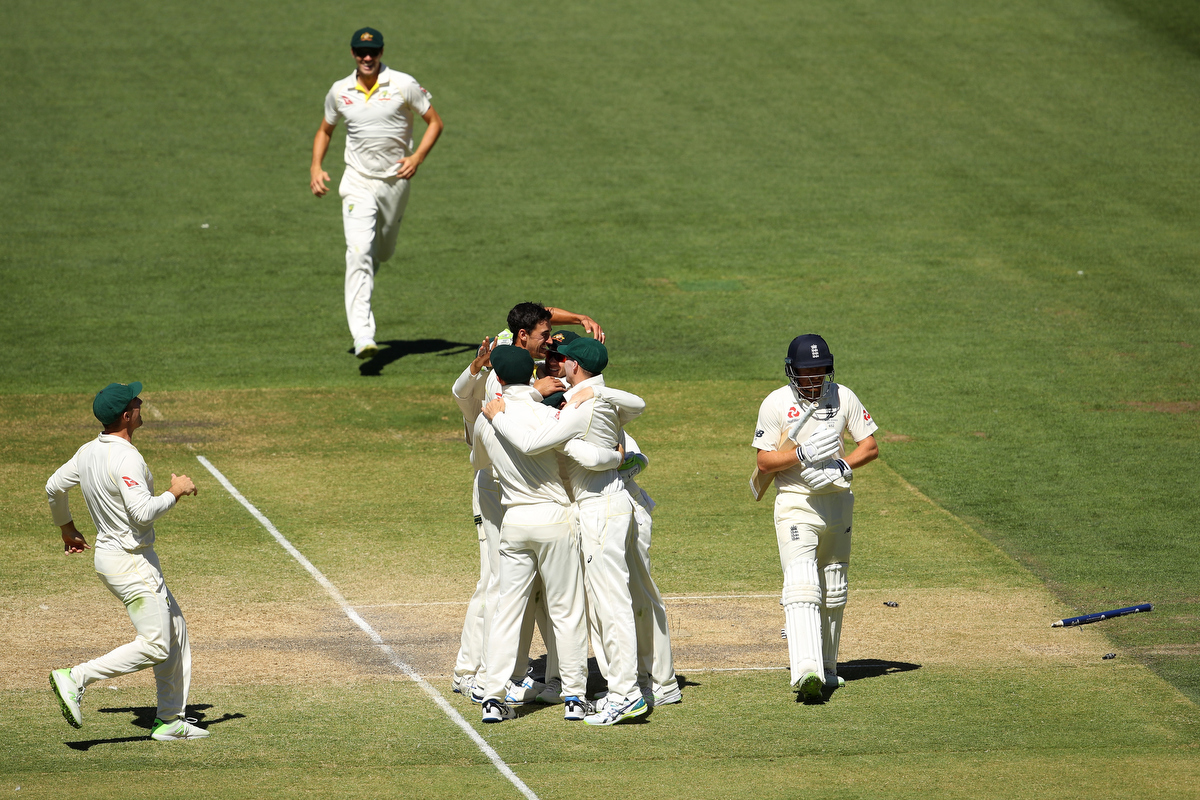ENGLAND’S PROMISE of a fighting finish to the Adelaide Test petered out quickly – and predictably – and the Ashes are all but lost, writes RON REED:
YOU DIDN’T have to be an all-singing, all-sledging soldier of the Barmy Army to find England’s rapid capitulation on the last day of the Adelaide Test disappointing. We all wanted to see a classic finish, in some cases regardless of who won. But was it surprising? Not very.
For starters, there was a plethora of statistical evidence to suggest that chasing such a target, more than 350, is difficult not quite to the point of impossibility but close, and those numbers exist for a reason. Secondly, in their three previous innings of this campaign England have consistently struggled with the bat, only just making it to 300 once. Bowled out this time for 233 their average score across the first two Tests is just one run more than that, which is more than 100 short of what they needed to pull off a shock win. The actual margin was 120. That’s a thrashing. Two thrashings, in fact, given the 10 wickets that separated the sides in Brisbane, and now the Ashes have all but been won and lost. In the long history of the little urn only one team, Australia in 1936-37, has come back from 0-2 down to prevail. And they were playing at home with Don Bradman leading the way.

While the tourists will take some heart from bowling Australia out for a paltry 138 in the second innings, the uncomfortable truth is that they were more or less handed that on a platter, gift-wrapped, when Steve Smith declined to enforce the follow on and instead chose to bat again himself in the most difficult conditions. The Australians admit it was a mistake that they would not make a second time around – well, some in the camp do although Smith remains ambivalent about it — and in any case there will be no further requirement for either team to bat against a pink ball under lights. Smith’s counterpart Joe Root can only hope that his star bowler Jimmy Anderson’s five-wicket haul, his first in four trips to Australia, proves to be more than an isolated cameo – otherwise, it’s difficult to see how they are going to force a win against a more competent and confident opposition.
Root, of course, made his own costly mistake by bowling first when he won the toss, a decision that he will not be allowed to forget for a very long time. On his first overseas tour as captain, and the Ashes at that, he is having a tough time of it, as all losing English captains do. He admitted after the game that he was disappointed and frustrated but not dismayed, “We showed a lot of character,” he said, adding that he believed his team was playing better cricket than the last one to tour Australia, which was whitewashed 5-0. “We have been in control for periods of both games, we just have to make it last longer,” he said. His own quick dismissal when the chase resumed was effectively the end of the match with the chase not even half-complete. He is not making the runs he should be as one of the best four batsmen in the world in most opinions, although two half-centuries from four innings is not exactly the failure that his predecessor and senior pro Alistair Cook is proving to be. “I have tried to lead from the front and not to be able to carry on was really disappointing,” he lamented.
Not surprisingly, Smith was upbeat about achieving such a positive result despite a few things going wrong along the way and England fighting back from a seemingly impossible position. “Very satisfying,” he said, admitting that he had been “a little bit nervous” the previous night when Root and co were making good headway in their long chase. But another 180 was always going to be a lot to run down with only six wickets so the nerves had abated by the time he got to the ground.
Smith admitted he had some second thoughts about the contentious follow-on decision but wouldn’t necessarily do it any differently in another set of similar circumstances. “In the end, we won the game.” And, yes, that’s all the justification any captain needs. He admitted he had endured a tough 24 hours with all the criticism coming his way over that and some wrong calls on decision reviews. “But that’s all part of being captain of your country,” he said. “You’ve got to make tough decisions and you’ve got to learn from it.”
While the final day was anti-climactic, the match was another big tick for day-night Test cricket. Over the five days 199,147 attended – a record cricket crowd for Adelaide – and they were rewarded with a contest that ebbed and flowed dramatically, which is all you can ask from Test cricket – except a tight finish of course, and even that was on the cards for a good while. Root was among those buoyed by the experience: “The atmosphere was remarkable, something special,” he said.
Much of that was generated by his own travelling supporters, the now familiar Barmy Army, who even had their own column in the local newspaper. One of their number was spotted one night marching down a street full of bars wearing a pair of pads, while in another bar on another night one was wearing a batting glove on his drinking hand. Perhaps they’re all awaiting a call from team management to lend a hand on the field as well as off it. Things haven’t got quite that bad yet, but they are pretty grim and not looking like they’re going to greatly improve any time soon.
RON REED has spent more than 50 years as a sportswriter or sports editor, mainly at The Herald and Herald Sun. He has covered just about every sport at local, national and international level, including multiple assignments at the Olympic and Commonwealth games, cricket tours, the Tour de France, America’s Cup yachting, tennis and golf majors and world title fights.



Discussion about this post